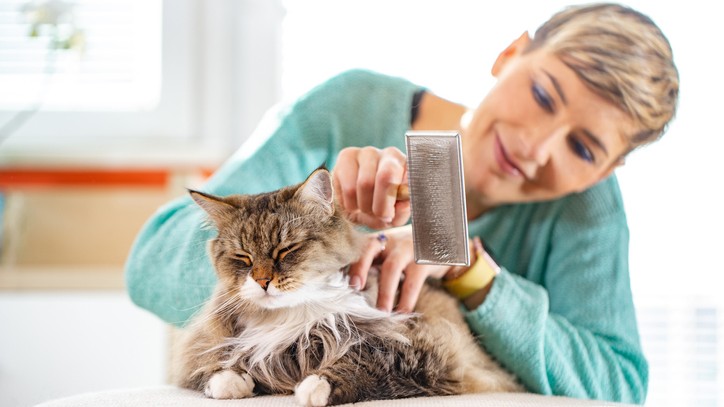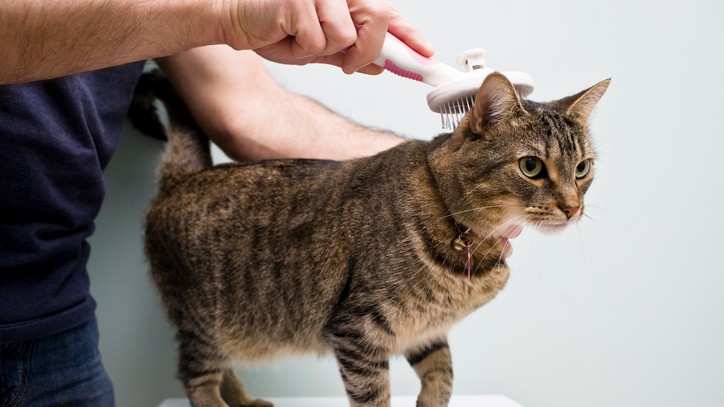How often should I brush my cat?
Ever wondered "How often should I brush my cat?" Here's the answer...

Here at PetsRadar, we often ask ourselves the question, “how often should I brush my cat”. We know that our feline friends groom themselves using a combination of their saliva, barbed tongue, forepaws and teeth but we also know that investing in the best cat brushes is beneficial in keeping their coat healthy and shiny.
- Best cat nail clippers: Cut their claws and save your sofa
- Best cat shampoo: Keep your cat clean and stop them scratching
- A vet's guide to grooming aggressive cats
Left alone, a cat's hair can become tangled and matted. Not only is this unattractive, it poses a danger to your cat's wellbeing. Fleas and ticks are more likely to be found hidden away in matted hair where they breed and bite, causing painful sores on your feline's skin. Flies will also be attracted to your cat if dirt becomes trapped in the fur.
The matting and tangling itself is painful too. Try tightly twisting strands of your own hair and you'll eventually feel a pull against your skin. When dead hair starts to stick together with oils from the skin, much the same happens. Knots start to form that tug on nerve endings and the matting can become so bad that a cat may even struggle to move, particularly if it's happening between the legs, around the collar and under the chest.
Matting can also happen when cats are shedding their undercoat – the hair gets caught in the top coat and a cat's own grooming process isn't sufficient in removing it all. Indeed, when a cat is shedding, licked loose hair starts to collect in the digestive system. If the build up fails to pass through a cat's body, it will be vomited as a hairball. As you can imagine, it's not pleasant for a cat and neither is it nice for your carpet and furnishings.
So that's an overview of why you should brush your cat. The next question then is how often you should do it. The answer to that is largely dependent on the length of your cat's hair. Of course, technique is also important so it's worth reading some top tips for brushing cats – that way you can be sure your grooming sessions are most effective.
How often should I brush my long-haired cat?
It is perhaps no surprise that long-haired cats require the most attention. The same goes for medium-haired cats, as well. Their hair is far more prone to matting and shedding so you should look to brush them every day.
The trick is to begin grooming when your cat appears to be most happy which will ensure you have sufficient time to pass a wide-toothed comb through the fur. It's a good idea to get them into a routine by trying to brush your long-haired cat at the same time. When they are peak shedding, however, you may want to step up the grooming to twice a day.
Here’s some more advice on grooming long-haired cats.

How often should I brush my short-haired cat?
You can generally be a bit more relaxed with short-haired cats. They tend to groom themselves very effectively so you can get away with brushing them just once-a-week. This will allow you to remove dust, dead skin and loose hairs, and you'll also have an opportunity to keep your eyes peeled for parasites.
If your short-haired cat spends a lot of time rolling in the dust outdoors, then you could groom more regularly than once-a-week. Just don't over-brush them. Too much brushing can cause bald patches or irritation to the skin. Keep the sessions short and stop if your cat starts to look uncomfortable. Any hissing or twitching is usually an indication that a cat has enough.
How often should I de-shed my cat?
If your feline friends are seasonally shedding, then you will need to groom them more regularly than once-a-week for short-haired cats or once-a-day for long-haired cats. Doing so means you'll be sure of removing as much loose hair as possible from their body so that it has much less chance to tangle or become ingested and removed as a hairball. A slicker brush is best for cat's for with long hair and dual-sided brushes are best for those with short hair.
How often should I brush my kitten?
Kittens need to be groomed as regularly as adults – so, again, that's daily for long-haired kitties and weekly for those with short hair. You won't need to spend as much time brushing kittens because of their size but you'll still need to ensure their hair is free of dirt, debris, matts, tangles and parasites.
Brushing kittens also gets them used to being groomed and, because they are less experienced self-groomers, you'll certainly be giving them a helping hand at this stage in their life. Be gentle and massage your kitten during their brushing sessions and you'll also be able to form a close bond.
But is brushing enough? One question you may ask is “do cats need baths?”. It's well known that cats don't like getting water on their fur and healthy felines can go their whole life without needing a bath. This should only become an option if a cat has developed skin disease or has come into contact with excessive dirt. Just remember to dry them properly.
Similarly, should you consider cat nail clipping too? Again, that depends on your cat. Keeping their claws trimmed, however, won't have any effect on matting or tangling: they don't generally drag those nails through their fur.
PetsRadar Newsletter
Get the best advice, tips and top tech for your beloved Pets

David Crookes has been a journalist for almost 30 years and he has written for a host of magazines, newspapers, websites and books including the World of Animals Annual, BBC Earth, Live Science, The Independent and Tom’s Guide.
Born in England, he lives with two cats but he’s also keenly interested in the differences between the huge number of dog breeds – in fact, you can read many of his breed guides that he’s written in collaboration with vets here on PetsRadar.
With a lifelong passion for technology, too, he’s always on the lookout for useful devices that will allow people to keep their pets happier and healthier, and provide them more time to spend together.
David has a degree from Durham University, as well as postgraduate diploma in journalism from the University of Central Lancashire.
